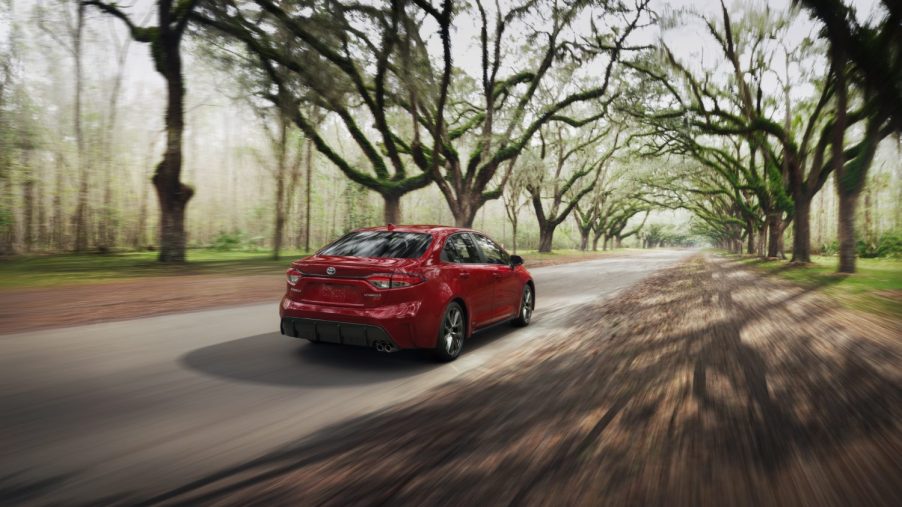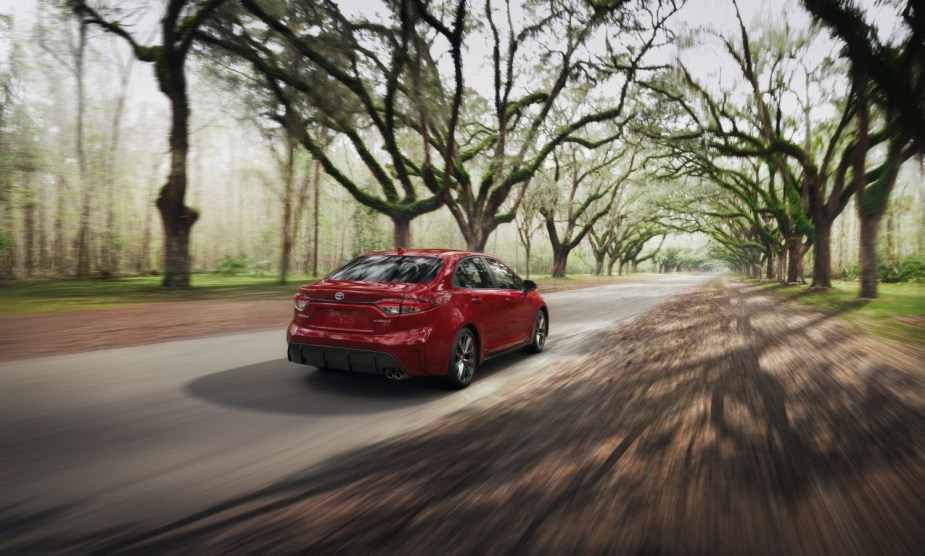
The 2023 Toyota Corolla Hybrid Gets You a Fuel-Efficient All-Wheel Drive Car Under $30,000
All-wheel drive is an ideal setup for anyone who lives in an area with lots of rain or four actual seasons. It’s also a choice setup for performance cars, having been embraced by premium auto manufacturers, including Audi, BMW, Mercedes-Benz, Lexus, and Porsche. The setup has become popular in all types of vehicles, with the exception of hybrid vehicles, which typically stick to front-wheel drive to maximize fuel economy. However, Toyota has taken exception to this rule and will offer the 2023 Toyota Corolla Hybrid with all-wheel drive. Not only is the Corolla Hybrid fuel efficient, but costs less than $30,000.
Here’s how the Toyota Corolla Hybrid’s AWD system works

According to Toyota, the Corolla Hybrid uses Toyota’s Electronic On-Demand All-Wheel Drive, making it the only compact hybrid car with an AWD system. The system uses a two-motor setup that pairs a 1.8-liter four-cylinder engine with a CVT automatic transmission. As an “on-demand” system, the electric motors are only engaged when needed.
Both front- and all-wheel drive hybrids use the same 1.8-liter engine, so it is unlikely the AWD hybrid’s performance will improve noticeably. Fuel economy may also dip slightly due to the added weight but is expected to be in line with the 2022 Corolla hybrid’s EPA estimate of 52 mpg combined.
All-wheel drive improves the Corolla Hybrid’s driving experience
Even though the Corolla Hybrid’s performance may not translate into faster 0-60 mph times or better fuel economy, it does improve the driving experience. Toyota says the system works seamlessly, distributing power to the rear wheels when needed to minimize front wheel slip. It also enhances cornering agility by reducing understeer.
This benefit translates into better traction for the Corolla Hybrid on wet or snow-covered roads. The reduced wheel slippage also decreases understeer caused by loss of traction. Regardless of road conditions, the increased traction translates into safer, more secure handling, which inspires more driving confidence.
Is FWD or AWD better?
For most drivers, all-wheel drive is better in just about every driving situation. As MotorTrend indicates, AWD vehicles leverage their mass and the contact patch of each tire to generate more “accelerative friction” or traction regardless of road conditions. Any fuel economy penalty is more than offset by the added performance and security benefits. Given the choice between AWD or FWD, if the goals are better traction, safety, and performance, AWD wins every time.
The downside to AWD is the systems are more expensive. They have higher maintenance costs due to more parts that can break or that need to be serviced. AWD cars are also harder on tires, requiring you to buy tires more frequently, and they get slightly less gas mileage.
FWD has distinct advantages as well. According to U.S. News, front-wheel-drive systems are typically lighter and more fuel-efficient than all-wheel-drive systems. They have fewer moving parts, which means less maintenance. If parts do break, they’re typically easier and cheaper to fix. Additionally, front-wheel-drive cars also tend to have more interior space than all-wheel-drive cars because they don’t have the added drivetrain elements.
There is a caveat to the AWD vs. FWD debate, and it has to do with tires. MotorTrend also points out that traction comes down to friction, which has as much to do with tires as it does with drivetrains. The right tire on a FWD vehicle can more than compensate for the performance of an AWD vehicle. For example, during cold, snowy weather, a FWD vehicle with dedicated snow tires will perform better than an AWD vehicle with all-season tires. Therefore, MotorTrend recommends skipping AWD and spending the money on two sets of tires.
For cars like the Toyota Corolla Hybrid, it ultimately comes down to your budget and what makes you feel the safest. In most cases, FWD will work just as well as AWD and be cheaper to maintain. However, if your driving conditions regularly include snow, unpaved roads, or lots of wet weather, AWD is a good investment.



